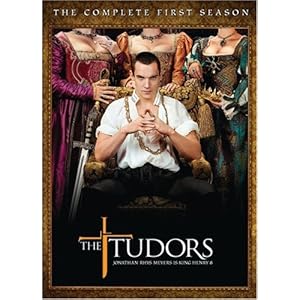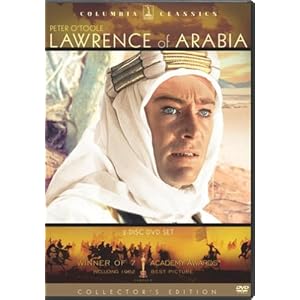
The Tudors is one of those shows that deserves to have quotation marks around the word historical in their descriptions. It's not that they go out of their way to make things up, but it's the simple fact that they are more concerned with telling a story and creating a mood than accurately portraying what happened. The Tudors tells the story of King Henry VIII, the guy we all ready about in school who had a bunch of wives and created the Church of England. Because of the limitations of covering a forty year reign in 38 episodes over the course of four years, many things are compressed and forgotten and compromised in order for it to be a series and not just a documentary.
And that's okay, really. Rome did the same thing, and it was pretty outstanding. But while I thought The Tudors was decent, something about it felt limited. Despite using Henry's parade of marriages as an excuse to turn him into a sex-crazed lunatic, the show really wasn't as trashy as I thought it would be. I wasn't expecting Spartacus: Blood and Sand levels of softcore pornography and fountains of blood, but I was definitely expecting more than there was. Long stretches of the show are merely people meeting at court and planning changes for the kingdom and stuff like that while all of the wars Henry got into occurred mostly off screen, and the worst thing you can really say about is that it's actually a little boring sometimes. The show gets in its fair share of sex scenes and decapitations (and hangings, and burnings at the stake, and drawing and quarterings), but it's not quite debaucherous enough to be pure fun, nor is it really well written enough to pull off a fully respectful treatment of the material. It was popular enough to stay on the air for as long as it did, but I have trouble imagining an audience that was completely satisfied with the series' tone.
Jonathan Rhys Meyers plays King Henry, and I was mostly pleased by his work. He's not exactly the most talented actor, but one of the most important things for the role was that he have a commanding, authoritative presence, which he does. I was also reasonably impressed by the way he handled the character's increasing age as the show wore on. The new Superman Henry Cavill plays the Duke of Suffolk, and is the only actor in a major role to appear in all four seasons besides Rhys Meyers. Unlike most other characters who exist to provide something for Henry to deal with (or have sex on top of), Cavill is mostly just a loyal friend who has problems of his own to deal with, which were often a nice change of pace from the main plot. Otherwise there are a lot of beautiful women who make their way through the court and often die, as well as a number of respected and/or recognizable actors appearing in brief but significant roles, like Sam Neill as a corrupt cardinal who's nonetheless on Henry's side or Peter O'Toole as the pope, who isn't having any of the king's Church of England crap.
So for four seasons we see Meyers grow from a young king to a nearly crippled old man, trying to find a wife that will bear him a male heir, juggling alliances with multiple other finicky monarchs, and rooting out dissent among his people. He puts a lot of people to death, ignores logic to support his own deluded beliefs, and never seems to fully connect with anyone around him. Some subplots were a lot more interesting than others, and you never know when a character you like will disappear or one you hate will hang on for way too long. It's a mostly watchable show that never gets too annoying to be unbearable or too good to make you really excited to keep going. Despite all this though, I found myself surprisingly moved as the series wound down and ended on its own terms. Not incredibly touched really, just surprised that I was a bit sad to see the slow decline of a man who's come to see that his best days are long behind him. The shift to old guy makeup seemed a bit drastic, but it worked nonetheless. The show was entirely written by creator Michael Hirst, and I think that might have been a mistake, because more people working on it could have meant a tighter and more thoroughly entertaining series. But in the end I kept watching it, because I enjoy these sorts of takes on interesting historical eras despite myself. Next I'm going to check out The Borgias, a show created by Neil Jordan that Hirst is producing.
Monday, April 4, 2011
The Tudors
Thursday, February 3, 2011
Ratatouille

I have finally seen every full length Pixar film that people actually seem to like. Ratatouille was one of the better ones, sliding nicely into my favorites with The Incredibles, Wall-E, and Toy Story 3. Like the first one it was directed by Brad Bird, who also did the excellent The Iron Giant before joining America's best animation studio. He's moving on now to live action with the next Mission: Impossible, and it will be interesting to see how his great storytelling talents survive the transition to huge budgets and name brand actors. Ratatouille does everything that Pixar is good at extremely well, and except for a couple hiccups here and there is really just a great movie from start to finish.
A lot of Pixar stories can be boiled down to "The Secret Lives of _____", and it's not inaccurate to use that formula here by filling in the blank with rats. The movie portrays them as more or less the creatures we know them, except with intelligence enough to fully understand English and grasp how they're regarded by humans. They're still mostly content to eat garbage and avoid direct contact, but due to an advanced sense of smell and taste Remy, played by Patton Oswalt, has developed an appreciation for human cooking, and the food of a famed French chef who claims that "anyone can cook" in particular. After his family is forced to leave their home he winds up in Paris, in the kitchen of the very same chef he admires, two years after his death. Through an unlikely but entertaining series of events he ends up helping a hapless but likable garbage boy become a successful cook in the restaurant, and even more unlikely he turns out to be the cook's heir, and that's where the real story begins.
The highlight of the film is the animation, which is both technically impeccable and marvelously kinetic and fun to look at. The animation of the rats is lifelike, to a creepy extent when there are swarms of them on the screen, and the humans are wonderfully characterized through unique mannerisms as well. The absolute best bits are whenever Remy is tugging on the garbage boy's hair to trigger his muscles and perform the steps of cooking without being seen, an idea that is hilariously absurd and even more hilariously animated. It's just the essence of pure physical comedy, perfect in how it doesn't need dialogue even while the boy's meek excuses for his awkward actions accentuate the humor. The relationship between them is a really interesting one, Remy unable to actually speak to humans but able to get his points across with squeaks and gestures. There's plenty of talent to go around with the voices, including well-known comedians, great actors like Ian Holm and Peter O'Toole, and some solid work by people you've never heard of.
If I had an issue with the movie, it's that a large part of the conflict that makes up the meat of the plot in the later stages isn't really justified in the movie. A rift forms between the human and rat leads, and there's no real reason for it, especially since the apparent cause is in complete opposition with what they seemed to want only a few scenes earlier. The movie needed something to happen, and they just sort of swept the need of actually having it make sense under the rug. It doesn't do to much to damage the rest of the movie though, which while not as deeply emotional as the most recent Pixar outfit, is still incredibly entertaining work. It's amazing how an action sequence featuring a rodent trying to get through a window in a busy kitchen can be more exciting than live action stuff that can cost millions to film. I guess I'll watch Cars some time and hope it's at least a fraction as compelling as stuff like this.
Saturday, November 13, 2010
Lawrence of Arabia

Lawrence of Arabia is certainly one of the most epic movies I've seen, in the true sense of the word. It's extremely long, and fully aware of its own importance. Over ten minutes of its nearly four hour running time are just the film's impressive score set against a black screen. It tells the mostly true story of T. E. Lawrence, a British military officer who became famous after helping to unite warring Arab tribes and lead them in revolt against the Turkish empire during World War I. The amount of area covered isn't exactly global in its scope, but you get a great feel for the tremendous size and danger of living in the desert, and the delicate politics of trying to keep natural enemies from killing each other in pursuit of a bigger goal.
Peter O'Toole plays Lawrence, and does a good job of it. He's the main character, and he did great things, but he's not exactly a good guy. He has compassion for others, but it's worn thin by constant fighting, and he eventually starts drinking his own Kool-Aid and believing himself to be invincible. He also has a sadistic streak that rears its head sometimes. An interesting way to handle a protagonist. The whole cast is good although it seems kind of odd to cast Europeans as Arabs nowadays, including Alec Guinness as a prince who gives him support early on.
But while the film tells an interesting story with a good cast, it wasn't as entertaining to actually watch as it could have been. It's not just the running time, I've seen plenty of films of similar length that haven't bored me to this extent at times. Scenes of Lawrence and others marching across the desert often seem endless and repetitive, and the plot never really seems to rev up or ever reach a true climax. There are moments of violence and significant drama, but no consistent rising action. The movie is broken into two acts, which confounds the typical narrative structure. It's well constructed and filmed by David Lean and his crew, it just wasn't as gripping as movies I find superior. There are a few scenes that are arresting in that sort of way, particularly the opening sequence which actually takes place at the end of the story, but not as many as there should have been. A Classic movie, but not exactly my cup of tea.

































